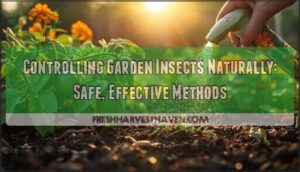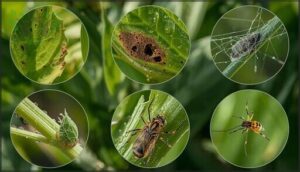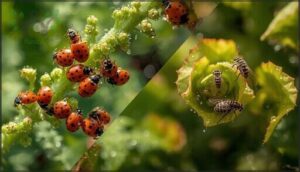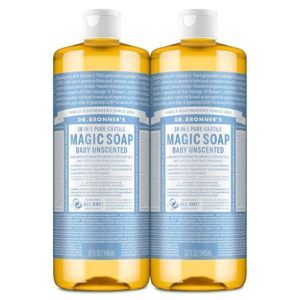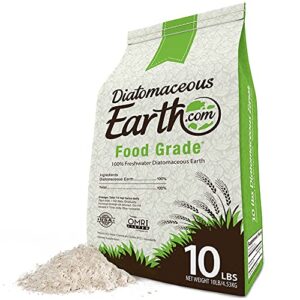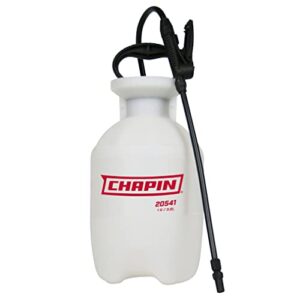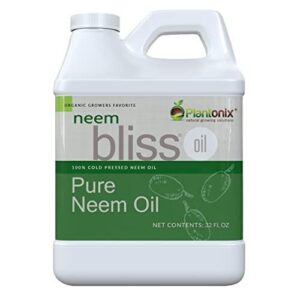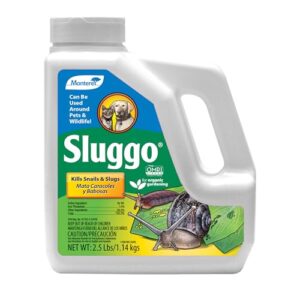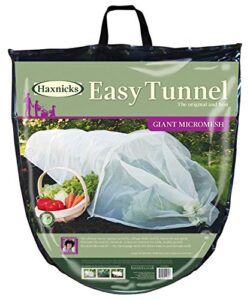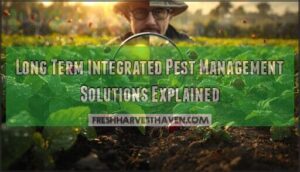This site is supported by our readers. We may earn a commission, at no cost to you, if you purchase through links.
Most gardeners don’t realize that dousing pests with synthetic chemicals often creates more problems than it solves. Chemical pesticides kill beneficial insects alongside harmful ones, disrupt soil ecosystems, and can contaminate groundwater that eventually flows back into your family’s drinking supply.
The alternative—controlling garden insects naturally—works with your garden’s ecosystem instead of against it. Natural methods protect the predatory insects that eat pests, build healthier soil that produces stronger plants, and eliminate the toxins that drift onto vegetables and seep into watersheds. You’ll find that organic pest management requires observing what’s happening in your garden beds and responding with targeted solutions rather than blanket chemical applications.
Table Of Contents
- Key Takeaways
- Why Natural Pest Control Matters
- Recognizing Common Garden Pests
- Boosting Plant Health for Pest Resistance
- Using Physical Barriers for Protection
- Companion Planting for Pest Prevention
- Attracting Beneficial Insects Naturally
- Natural Pest Control Methods That Work
- Organic Sprays and Dusts for Pest Management
- Sustainable Garden Maintenance Practices
- Top 7 Products for Natural Pest Control
- Frequently Asked Questions (FAQs)
- How to get rid of garden insects naturally?
- What is the best natural pesticide for vegetable gardens?
- What can you put on garden plants to keep bugs away?
- Do coffee grounds repel bugs?
- What home remedy kills bugs in a vegetable garden?
- What’s the best thing to keep bugs out of your garden?
- What is the best natural pest control for gardens?
- How do I stop bugs from eating my vegetables?
- Will vinegar keep bugs off garden plants?
- How do I identify beneficial insects from harmful ones?
- Conclusion
Key Takeaways
- Natural pest control preserves beneficial insects and soil health while eliminating toxic chemicals that contaminate groundwater and harm pollinators, creating a sustainable garden ecosystem that resists pests more effectively than synthetic pesticides.
- Building strong plant defenses through compost application, proper watering techniques, and companion planting prevents pest problems before they start, reducing infestations by 15 to 40 percent compared to reactive chemical treatments.
- Physical barriers like fine mesh netting, row covers, and strategic fencing provide immediate protection against specific pests without harming the garden ecosystem, while attracting beneficial predators through native flowers and insect habitats offers long-term biological control.
- Organic sprays such as neem oil, insecticidal soap, and food-grade diatomaceous earth effectively manage persistent pest problems when applied correctly, working best as part of an integrated approach that includes regular inspections, good garden hygiene, and hand-picking visible insects.
Why Natural Pest Control Matters
Synthetic pesticides might promise quick results, but they come with hidden costs that affect your garden, your family, and the environment around you.
A solid fruit tree disease prevention guide helps you monitor pests early, avoiding costly treatments and protecting your harvest before problems spiral out of control.
Choosing natural pest control protects beneficial insects, keeps harmful chemicals out of your soil and water, and creates a healthier space for everyone who enjoys your garden.
Understanding why these methods matter helps you make informed decisions that lead to long-term success.
Risks of Chemical Pesticides
Toxic exposure from chemical pesticides poses real dangers you shouldn’t ignore. Studies link these products to acute poisoning, long-term cancers, and developmental issues in children.
Environmental impact extends beyond your garden—runoff contaminates water, harms wildlife, and accelerates pesticide resistance in pests.
Human health risks and ecosystem damage make natural pest control, organic pest control, and chemical-free pest control methods worth exploring for safer, non-toxic biological pest control solutions.
Recent studies highlight that widespread pesticide exposure risks continue to threaten both human and environmental health in Europe.
Benefits for Garden Ecosystems
Switching to natural pest control transforms your garden into a thriving ecosystem balance hub. You nurture soil health, support biodiversity, and create microclimates simultaneously. Beneficial insects multiply, delivering biological control that strengthens your garden ecosystem without harsh interventions.
Natural pest control turns your garden into a self-sustaining ecosystem where healthy soil and beneficial insects do the work for you
- Healthy soil teams up with microbes that feed your plants naturally
- Native flowers create year-round buffets for pollinators and pest predators
- Dense plantings cool the air and hold moisture like nature’s own thermostat
- Earthworms tunnel through rich earth, boosting nutrient flow to hungry roots
- Wildlife conservation happens right in your backyard, one garden bed at a time
Maximizing garden health is possible by understanding the role of layered diversity structure in ecosystem design.
Protecting Pollinators and Wildlife
When you skip synthetic pesticides, you become a pollinator conservation champion. Bees, butterflies, and hummingbirds thrive in gardens practicing eco-friendly gardening and sustainable landscaping.
Plant diverse natives that bloom spring through fall, creating wildlife preservation zones right at home. Your natural pest control choices support beneficial insects and garden ecosystem health while advancing environmental conservation.
Shallow water dishes and undisturbed leaf piles offer biodiversity support, transforming your yard into a wildlife sanctuary.
Recognizing Common Garden Pests
Not every bug in your garden is the enemy. Before you can protect your plants effectively, you need to know which insects cause real damage and which ones are actually helping you out.
Let’s look at how to spot the troublemakers, recognize what they’re doing to your plants, and tell them apart from the beneficial insects you want to keep around.
Identifying Harmful Insects
Before you can defend your garden, you need to know your enemy. Start by examining shape and color—beetles sport hard wing covers, while true bugs have distinct segmented bodies. Understanding insect life cycles and bug behavior helps you time your interventions perfectly:
- Check antennae shape and wing patterns for quick identification
- Note whether insects are slow crawlers or rapid fliers
- Record which plants they target, since many pests specialize
Regular garden inspections catch problems early.
Signs of Pest Damage
Your plants tell the story of what’s attacking them. Leaf damage—like irregular holes or bronzed patches—reveals chewing beetles or sap-sucking aphids.
Stem borers leave tiny exit holes with sawdust trails, while webbing signs point to spider mites. Fruit scars and bark lesions confirm feeding activity.
Spotting these clues early strengthens your natural pest control strategy, keeping your garden healthy through organic gardening techniques and smart pest management.
Differentiating Pests From Beneficial Bugs
Bug identification separates the good guys from the villains in your garden. Beneficial insects often have piercing or crushing mouthparts and hunt smaller pests instead of munching leaves.
Watch for these clues:
- Lady beetles and lacewings cluster on aphids rather than damaging foliage
- Predatory insects patrol plant surfaces slowly, inspecting for prey
- Pests like aphids and whiteflies gather on leaf undersides, causing visible curling
Understanding pest behavior strengthens your biological controls and natural pest control strategy.
Boosting Plant Health for Pest Resistance
Strong, healthy plants naturally fend off pests better than weak or stressed ones. When you give your garden the right foundation—good soil, consistent water, and regular care—you’re building a defense system from the ground up.
Here are three essential practices that help your plants resist insect damage before it starts.
Nourishing With Compost
Your garden’s first line of defense starts beneath the surface. Finished compost adds 2 to 5 percent organic matter in a three to six inch layer, releasing nitrogen, phosphorus, and potassium steadily through the season. This soil enrichment boosts microbe balance and nutrient cycling, strengthening plants against pests naturally.
| Compost Benefits | Impact on Garden |
|---|---|
| Organic fertilizers feed microbes | Enhanced soil food webs |
| Improved water retention | 30% less irrigation needed |
| Stable pH and nutrients | Healthier root systems |
| Disease suppression | Reduced pest susceptibility |
These sustainable gardening practices support organic gardening and natural pest control methods better than synthetic options.
Proper Watering Techniques
Water delivers nutrients directly to roots, and consistent soil moisture keeps plants strong enough to resist pests. Deep watering to 6 to 8 inches encourages downward root growth and improves drought tolerance.
You’ll see the best results when you:
- Water early in the morning to reduce evaporation and fungal risk
- Use drip irrigation or soaker hoses for water conservation
- Check soil moisture before watering to avoid overwatering
- Apply mulch to stabilize moisture and support garden hygiene
These sustainable gardening practices strengthen natural pest control methods while supporting efficient garden maintenance and organic gardening goals.
Pruning Damaged Foliage
Removing damaged tissue is like closing doors to unwanted visitors—pests and disease colonize weakened foliage first. Cut dead or diseased stems back to healthy wood using clean pruning tools, leaving no stubs larger than a quarter inch.
Seal and discard pruned material to maintain garden sanitation. This essential foliage removal aids plant recovery and strengthens natural pest control techniques within your organic gardening and pest management routine.
Using Physical Barriers for Protection
Physical barriers give you a straightforward way to keep pests off your plants without relying on sprays or chemicals. These methods work by creating a shield between your crops and the insects that want to feed on them.
Here are three reliable options to protect your garden from unwanted visitors.
Garden Mesh and Netting
Fine mesh acts like a security gate for your crops, keeping unwanted insects out while letting in the essentials: sunlight, air, and rain. You’ll find mesh size options from 0.5 to 2.0 millimetres in durable PVC coated or galvanised steel varieties.
Here’s what makes this barrier installation worthwhile:
- Blocks flying and crawling pests without harming natural predators
- Transparent netting materials let you monitor plant health easily
- Protects cucumber and tomato beds while preserving airflow
- Reusable for multiple seasons with proper mesh maintenance tips
Row Covers for Young Plants
Lightweight spunbonded fabrics offer your seedlings a protective shield against beetles, aphids, and cabbage moths while still allowing water and sunlight through.
You’ll drape these row covers directly over young plants and anchor the edges with soil or weights, leaving slack for growth. Choose fabric weights between 0.6 and 1.2 ounces per square yard for ideal seedling shielding during those vulnerable early weeks.
Fencing Against Larger Pests
While row covers handle insects, deer barriers and garden enclosures protect against rabbits, groundhogs, and deer.
Install an 8-foot fence with mesh sizes of 2 inches or smaller around your perimeter. For burrow protection, extend fencing 12 to 24 inches below ground to block digging.
These fence materials work alongside other pest control methods, preserving your crops without harming natural predators.
Companion Planting for Pest Prevention
Companion planting puts nature’s defense to work in your garden. By pairing certain plants together, you can repel pests, confuse them, or make your vegetables less appealing targets.
Here are three proven approaches to using companion plants for natural pest prevention.
Best Companion Plant Combinations
You’ll want to pair plants that actually work together in the garden. Some combinations offer real protection through scent confusion or by attracting helpers that keep destructive bugs in check.
- Tomatoes with basil and oregano deter thrips and whiteflies while drawing in beneficial insects
- Carrots alongside onions confuse pests through mixed aromas that mask each crop
- Marigolds near nightshades suppress soil nematodes that damage tomato and pepper roots
Using Herbs and Flowers as Deterrents
Building on those pairings, certain herbs and flowers bring extra muscle through aromatic pest control. Lavender and peppermint oils confuse insect scent cues, while chrysanthemums contain natural pyrethrins that act as contact insecticides. You can create fragrant border plants using these insect-repellent plants for effective natural deterrents.
| Herb/Flower | Scent Benefit | Pests Deterred |
|---|---|---|
| Basil | Strong fly-repelling oils | Flies, mosquitoes |
| Rosemary | Perennial hedge aroma | Flea beetles, flies |
| Marigold | Root-level compounds | Nematodes, beetles |
This herb garden planning enhances organic gardening and companion planting strategies, giving you practical natural pest control techniques for season-long protection.
Crop Rotation Benefits
Changing crop families each season breaks pest life cycles and drops infestation risk by 15 to 40 percent. Soil fertility improves as legumes fix nitrogen and deep-rooting crops draw minerals upward.
Pest breaks occur when you disrupt host availability, while weed suppression thrives through inconsistent growth windows. Water efficiency climbs thanks to better soil structure, and long term health builds through sustainable agriculture and integrated pest management.
Attracting Beneficial Insects Naturally
Your garden doesn’t need chemicals to stay pest-free when you have an army of helpful insects working for you. Ladybugs, lacewings, and parasitic wasps naturally hunt down aphids, whiteflies, and caterpillars before they damage your plants.
Here are three straightforward ways to bring these natural pest controllers into your garden and keep them around all season.
Planting Native Flowers
Native flower selection forms the backbone of effective pollinator support and biodiversity enhancement in your garden. When you choose species that bloom at overlapping times, you’re creating a buffet that feeds beneficial insects from spring through fall.
Consider these eco-friendly gardening solutions:
- Plant nectar-rich natives to support early and late season pollinators
- Mix tall, mid, and low-growing species for layered structure
- Group by water needs to boost water conservation
This companion planting approach naturally attracts ladybugs, lacewings, and parasitic wasps that control aphids and other pests.
Creating Insect Habitats
You can transform bare corners into havens by installing insect lodging like bee hotels with 2 to 10 millimeter holes. Leave ground habitats through shallow leaf piles and bare soil patches for nesting beetles.
Add log shelters and brush piles near perimeters. Set out shallow water sources and surround these eco-friendly gardening solutions with native plants and companion planting combinations that support organic gardening year-round.
Avoiding Broad-Spectrum Pesticides
Broad-spectrum pesticides wipe out your garden allies along with pests. Target specific problems with selective sprays and narrow spectrum products instead.
Use pest monitoring to confirm what you’re dealing with, then apply integrated methods like insecticidal soap, diatomaceous earth, or neem oil at the lowest effective dose. Time organic pest control when pollinators aren’t active, and rotate natural pesticides to preserve beneficial insects.
Natural Pest Control Methods That Work
Sometimes the most effective pest control methods don’t come from a bottle or package. Simple hands-on techniques can make a real difference in managing garden pests without introducing any chemicals into your outdoor space.
Here are three straightforward approaches that put you in direct control of your pest problems.
Hand-Picking Pests
Sometimes the simplest organic gardening solution is the most effective. Hand removal gives you complete manual control over garden pest management without chemicals.
Inspect plants every 2–4 days during peak growing season, focusing on foliage and undersides of leaves. Drop caterpillars, aphids, and beetles into soapy water. This garden vigilance catches pests before populations explode, giving you real freedom from infestations.
Pruning and Clearing Debris
Clearing away fallen leaves, weeds, and pruning dead branches removes winter hideouts for pests and cuts down on disease. Good garden sanitation through regular yard cleanup gives you real control over infestations before they start.
Use sharp pruning tools for clean cuts, and keep up with deadheading techniques—healthy garden maintenance tips that strengthen pest prevention and boost overall garden health naturally.
Setting Beer Traps for Slugs
Beyond clearing debris, beer traps offer a low-cost solution for stubborn slug problems. Bury shallow containers at soil level, fill them one-third to one-half full with pale beer, and space traps 1 to 2 meters apart in damp, shaded areas.
This trap placement strategy exploits slug behavior patterns, drowning pests attracted to the yeast scent. Refresh beer bait every 1 to 3 days to maintain slug trap effectiveness and support your garden slug prevention efforts.
Organic Sprays and Dusts for Pest Management
When barriers and beneficial insects aren’t enough, organic sprays and dusts offer targeted control without toxic residues.
These methods work best when applied early and reapplied as needed throughout the growing season. Here are three reliable options you can use to manage persistent pest problems in your garden.
Neem Oil Applications
You’ll find neem oil to be one of the most adaptable natural pesticides in your garden arsenal. Mix 2 to 3 tablespoons per gallon of water and spray the undersides of leaves where aphids, whiteflies, and mites hide.
This organic spray disrupts feeding and growth, acting as both a contact insecticide and stomach insecticide. Reapply every 7 to 14 days during active pest periods for best results.
Homemade Insecticidal Soap
Making your own insecticidal soap offers a cost-effective way to control soft-bodied pests like aphids and spider mites. Combine 2 teaspoons of pure castile soap with 8 ounces of water to create an organic soap spray that disrupts insect protective coatings.
Apply this solution carefully:
- Test on a single leaf first to check for phytotoxic risk.
- Spray during early morning or evening when temperatures stay below 85°F.
- Target lower leaf surfaces where pests gather.
Using Diatomaceous Earth Safely
Diatomaceous earth acts as a mechanical insecticide in organic pest control, dehydrating crawling insects without chemical toxins. Always choose food-grade powder to guarantee safety for your organic gardening efforts.
Wear a dust mask and eye protection during application, then lightly dust soil surfaces when winds are calm. This nontoxic method works best as part of eco-friendly pest control strategies, reapplied after rain for continued effectiveness.
Sustainable Garden Maintenance Practices
A healthy garden isn’t just about quick fixes—it’s about building habits that keep pests from taking hold in the first place. Simple, consistent care makes your plants more resilient and gives you the upper hand before problems spiral out of control.
Here are three maintenance practices that form the backbone of natural pest management.
Regular Garden Inspections
Regular garden inspections are your first line of defense in pest management. Walk through your beds weekly, checking soil moisture and drainage to prevent stress that invites pests. Look for early warning signs like discolored leaves or tiny aphid clusters.
Use inspection schedules to track pest patterns and document outbreaks. This garden monitoring approach lets you respond quickly with hand-picking or DIY traps before infestations spread.
Good Hygiene and Cleanup
Keeping your garden tidy is one of the most effective Organic Gardening Methods for Pest Management. Debris Removal and Garden Sanitation work hand in hand—rake up fallen leaves and spent vines that shelter slugs and overwintering beetles.
Weed Management eliminates alternate hosts for thrips and leafhoppers. Don’t forget Tool Cleaning with soapy water and a bleach dip to prevent spreading disease. Proper Waste Disposal completes your Garden Hygiene routine, creating an EcoFriendly Gardening Solutions foundation that starves pests of hiding spots.
Mulching and Soil Health
A two to four inch mulch depth shields roots from swings in soil temperature while boosting organic matter as it breaks down.
That organic decay sparks microbial activity and nutrient cycling, feeding your plants steadily.
Pair mulching with companion planting and garden hygiene for a complete organic gardening methods toolkit—these ecofriendly gardening solutions outperform natural pesticides by stopping pests before they take hold.
Top 7 Products for Natural Pest Control
You’ve built a strong foundation with good practices, and now the right tools can make your pest control efforts even more effective.
The following seven products support natural pest management without introducing harsh chemicals into your garden. Each one tackles specific challenges you’ll encounter as you protect your plants throughout the growing season.
1. Dr Bronner’s Baby Castile Soap
Dr. Bronner’s Baby Castile Soap works as a gentle insecticidal soap for soft-bodied pests like aphids and mites. This concentrated formula combines organic coconut, olive, hemp, and jojoba oils to create a biodegradable solution that disrupts pest membranes without harsh synthetic chemicals.
You’ll dilute 2 to 3 tablespoons per gallon of water, then spray directly on affected plants. The unscented version won’t irritate sensitive skin during application, and its fair trade certification promotes responsible farming practices while protecting your garden ecosystem.
| Best For | Gardeners looking for a non-toxic, biodegradable pest control option that’s safe around kids, pets, and edible plants. |
|---|---|
| Primary Use | Multi-purpose soap |
| Form | Liquid |
| Weight | 4.6 pounds |
| Natural/Organic | Yes |
| Application Type | Diluted spray |
| Reusable | Yes |
| Additional Features |
|
- Multi-purpose concentrated formula works as insecticidal soap and can be used for dozens of household cleaning tasks
- Made with certified organic and fair trade ingredients, so it’s gentle on plants and won’t harm beneficial insects when used properly
- Cost-effective because a little goes a long way—one bottle lasts months even with regular garden spraying
- Requires dilution and careful mixing to avoid damaging plants or using too much product
- Can dry out skin with repeated use, so gloves are recommended during application
- May need multiple applications to fully control heavy pest infestations compared to synthetic pesticides
2. Diatomaceous Earth Powder Supplement
This 10-pound powder delivers a dual punch against crawling insects while supporting your garden’s soil health. Made from fossilized diatoms with 80 to 90 percent silica content, it physically damages soft-bodied pests like ants and fleas by abrading their protective outer layer.
You’ll dust it lightly around plant bases and garden bed perimeters, reapplying after rain. The OMRI-listed, food-grade formula remains safe for organic gardening when you wear a dust mask during application and avoid flowering areas where pollinators feed.
| Best For | Organic gardeners and homeowners looking for a natural, chemical-free solution to control crawling pests like ants and bedbugs while improving soil quality. |
|---|---|
| Primary Use | Natural pesticide |
| Form | Powder |
| Weight | 10 pounds |
| Natural/Organic | Yes |
| Application Type | Direct application |
| Reusable | Yes |
| Additional Features |
|
- OMRI-listed and food-grade, making it safe for organic gardening and multiple dietary lifestyles
- Works as both a natural pesticide against soft-bodied insects and a soil conditioner for healthier plants
- Large 10-pound size offers long-lasting value for treating multiple areas around your home and garden
- Can irritate respiratory systems, especially for people with asthma, requiring careful application with protective gear
- Needs frequent reapplication after rain or watering, demanding ongoing effort
- Must be kept away from flowering areas to protect beneficial pollinators like bees
3. Chapin Multi Purpose Sprayer
This one-gallon sprayer puts your liquid pest controls exactly where you need them with its foaming nozzle and 34-inch reinforced hose. You’ll spray neem oil emulsions, insecticidal soaps, and organic foliar feeds through the adjustable wand that reaches up to 12 inches for precise coverage.
The anti-clog filter keeps you working without constant stops to clean parts. Its ergonomic pump handle reduces hand fatigue during extended sessions, while the poly tank with nitrile seals accommodates most organic garden chemicals safely.
| Best For | Gardeners who need precise foaming application of pest controls and fertilizers in smaller yard areas or raised beds. |
|---|---|
| Primary Use | Chemical application |
| Form | Spray equipment |
| Weight | 2.03 pounds |
| Natural/Organic | No |
| Application Type | Foaming spray |
| Reusable | Yes |
| Additional Features |
|
- Foaming nozzle delivers thicker coverage with better accuracy than standard sprayers
- Anti-clog filter keeps you working without frequent cleaning breaks
- Lightweight at just over 2 pounds with an ergonomic handle that’s easy to pump and carry
- Some users report leaks around the pump seal that can waste product
- Build quality concerns compared to similarly priced competitors
- Limited to basic foaming chemicals—not all concentrates work with the nozzle design
4. Neem Bliss Pure Neem Oil
This cold-pressed oil from Indian neem seeds delivers up to 50 percent better pest control when you mix 2 to 3 tablespoons per gallon of water. You’ll tackle aphids, spider mites, and rose slugs while repelling future invaders with its natural azadirachtin content.
The unrefined formula preserves bioactive compounds that stressed plants need most. Though it solidifies in cold weather and carries a strong scent, warming the bottle restores its pourable consistency for your regular spray schedule.
| Best For | Gardeners looking for an organic pest control solution that works on both indoor and outdoor plants without harsh chemicals. |
|---|---|
| Primary Use | Pest control oil |
| Form | Liquid oil |
| Weight | 2 pounds |
| Natural/Organic | Yes |
| Application Type | Diluted spray |
| Reusable | Yes |
| Additional Features |
|
- Cold-pressed formula preserves natural compounds for up to 50% better pest control against common invaders like aphids and spider mites
- Pure neem oil from Indian seeds contains azadirachtin that kills existing pests and repels new ones
- Safe to use around homes and pets when properly diluted, making it family-friendly
- Solidifies in cold temperatures and needs warming before each use
- Strong natural smell that some users find unpleasant during application
- Bottle design makes pouring tricky and can lead to spills or oily residue
5. Monterey Sluggo Slug Killer
Monterey Sluggo uses iron phosphate granules that stop slugs and snails without threatening your pets or local wildlife. You’ll scatter these pellets around plant bases and along shady pathways where these pests travel, then watch them work through rain and light irrigation.
The OMRI-listed formula breaks down into soil-friendly nutrients that feed your lawn, giving you dual benefits. Though birds and curious puppies may snack on the pellets between applications, you can reapply after heavy rainfall to maintain protection through harvest day.
| Best For | Organic gardeners who need effective slug and snail control that’s safe around pets and wildlife while also enriching the soil. |
|---|---|
| Primary Use | Slug and snail control |
| Form | Granules |
| Weight | 2.8 pounds |
| Natural/Organic | Yes |
| Application Type | Granular spread |
| Reusable | No |
| Additional Features |
|
- Iron phosphate formula is OMRI-listed and safe for pets, beneficial insects, and wildlife
- Continues working after rain and doubles as a slow-release fertilizer when it breaks down
- Easy to apply as granules around plants, garden beds, and problem areas
- Needs frequent reapplication after heavy rain or in consistently wet conditions
- Birds and other animals may eat the pellets, reducing effectiveness between applications
- Curious pets like puppies might be attracted to and ingest the granules
6. Haxnicks Easy Micromesh Tunnel Cloche
This tunnel cloche uses 0.6 mm micromesh that blocks carrot fly, aphids, and leek moth while letting light and water reach your crops. You’ll set up the 118-inch accordion frame in minutes over rows of lettuce or carrots, then adjust the drawstring ends to seal gaps where pests sneak through.
The galvanized steel hoops resist rust across seasons, and you can fold the whole structure flat for winter storage. It also shields seedlings from late frost and reduces watering needs by trapping moisture underneath.
| Best For | Home gardeners who want to protect vegetable rows from flying pests and frost without constantly lifting heavy covers for daily care. |
|---|---|
| Primary Use | Plant protection barrier |
| Form | Physical barrier |
| Weight | 2.2 pounds |
| Natural/Organic | Yes |
| Application Type | Physical coverage |
| Reusable | Yes |
| Additional Features |
|
- Sets up fast with a pre-attached accordion frame—no wrestling with separate hoops or clips
- Fine 0.6 mm mesh stops carrot fly and aphids while you water and feed right through the material
- Galvanized steel hoops hold up season after season and fold flat when you’re done
- The 18-inch height won’t work once broccoli or Brussels sprouts get tall
- You’ll need to fully remove it or awkwardly lift sections to weed or harvest inside
- Some users found the mesh tore or hoops bent after just a couple years of use
7. Alpurple Garden Bug Netting Cover
This 20 x 10 foot PE mesh drapes over fruit trees, tomato stakes, and berry bushes to block birds and insects without suffocating your plants.
You’ll cut it to any shape you need, then secure the edges with pegs or bury them to seal out gaps. The drawstring closure cinches around branches for wind-resistant coverage, and the fine weave lets you check plant health without removing the netting.
It tolerates sun exposure across the season and rinses clean between uses.
| Best For | Gardeners who need a flexible, see-through barrier to protect vegetable beds, fruit trees, and berry bushes from birds and insects during the growing season. |
|---|---|
| Primary Use | Insect netting |
| Form | Mesh netting |
| Weight | 0.74 kilograms |
| Natural/Organic | N/A |
| Application Type | Physical coverage |
| Reusable | Yes |
| Additional Features |
|
- Cuts to any size and cinches around plants with a drawstring, so you can wrap irregular shapes like tree branches or raised beds
- Fine mesh blocks pests while staying transparent enough to monitor ripening fruit and check for disease without pulling the net off
- Stands up to full-sun exposure and rinses clean, making it reusable season after season
- Tears easily if snagged on sharp stakes or handled roughly during installation
- Edges aren’t hemmed, so the fabric can fray over time if you cut it frequently or leave it exposed to wind
- Only works if you bury or peg every edge—gaps let insects slip through and defeat the purpose
Frequently Asked Questions (FAQs)
How to get rid of garden insects naturally?
You can eliminate garden insects by combining tactics like inviting predators, hosing off aphids, applying neem oil every week or two, and placing diatomaceous earth around vulnerable plants.
What is the best natural pesticide for vegetable gardens?
Neem oil stands out as the top choice for vegetable gardens, disrupting insect feeding and sterilizing eggs without harming edible crops when properly diluted at 1 to 2 percent.
What can you put on garden plants to keep bugs away?
You can spray neem oil mixed at two to three tablespoons per gallon, apply insecticidal soap to leaf surfaces, dust diatomaceous earth around plant bases, or use garlic and hot pepper sprays as repellents.
Do coffee grounds repel bugs?
Coffee grounds can deter certain pests like slugs and ants with their strong scent and abrasive texture.
However, the effect is temporary and works best when you reapply after rain or watering.
What home remedy kills bugs in a vegetable garden?
In tackling pests, you can whip up a simple insecticidal soap by mixing 1 to 2 teaspoons of mild liquid soap per liter of water, targeting aphids and mites effectively.
What’s the best thing to keep bugs out of your garden?
The best defense against bugs is building healthy soil and strong plants.
You’ll find that well-fed, properly watered gardens naturally resist pest colonization better than stressed ones, cutting infestations by up to 30 percent.
What is the best natural pest control for gardens?
You’ll find that combining strong plant health, physical barriers, beneficial insect habitats, and targeted organic remedies like neem oil creates the most resilient defense against garden pests without harming the environment.
How do I stop bugs from eating my vegetables?
You can stop bugs from eating your vegetables by using row covers, planting pest-repelling herbs nearby, hand-picking insects regularly, and applying neem oil or insecticidal soap to affected plants.
Will vinegar keep bugs off garden plants?
Vinegar may repel some pests temporarily, but it’s not a reliable solution. Its acidity can damage plant tissue and leaves, especially when applied directly.
Safer alternatives like neem oil offer better protection without risking your plants.
How do I identify beneficial insects from harmful ones?
Look closely at an insect’s shape and behavior. Beneficial predators like lady beetles have round, spotted bodies, while lacewings display delicate, translucent wings.
Harmful pests such as aphids cluster densely on new growth.
Conclusion
Your garden thrives when you work with nature, not against it. Your soil strengthens when beneficial insects patrol the rows. Your plants resist damage when you’ve built their defenses through compost and companion planting.
Controlling garden insects naturally protects the ecosystem that feeds you while eliminating the toxins chemical sprays leave behind. Start with one method—hand-picking pests, installing row covers, or mixing insecticidal soap—and watch your garden respond with vigor that synthetic solutions never deliver.

